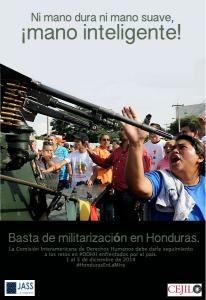






Tegucigalpa, M.D.C., December 1st, 2014- The Inter-American Commission on Human Rights (IACHR ) began its visit to Honduras today. As the ultimate mechanism invested in the protection and promotion of human rights throughout the American continent, the visit demonstrates the IACHR’s particular interest and concern about the situation in the country.
Within this framework, we the undersigned organizations declare:
First: Ever since the coup d’état in 2009, the weakening of the democratic institutions has continued. The authorities have not recognized the breakdown of constitutional order; most human rights violations committed in this context remain unpunished; and the institutions (such as the Supreme Court and the Army), which facilitated the coup , have not yet been punished. Moreover, due to the alignment of the legislative and judicial power with the dictates of the executive, judicial independence remains a distant yearning.
Second: Military authority has gradually increased at the expense of civilian power. At present, various public institutions are run by military personnel such as: the Directorate of Immigration, Civil Aviation, HONDUTEL, the National Registry, among others. Additionally, the government created the military police to maintain public order and now seeks to give it constitutional status, even though there have been reports of the military’s involvement committing human rights violations.
Third: Despite new provisions modifying the method for setting the number of violent deaths and preventing access to public information, violence rates have not decreased. According to the National Observatory of Violence, 79 violent deaths per 100,000 inhabitants were registered for 2013. Yet, impunity for such crimes is almost absolute (92%).
Fourth: Honduras owes a debt to its inhabitants to fulfill the guarantee of their human rights. While action plans on human rights have been approved, they are not being implemented. Of particular concern are the rights of indigenous peoples who face discrimination and exclusion, people of African descent, who face land dispossession and risk disappearance; discrimination and violence against women, girls, and young people, as well as discrimination and violence against people of lesbian communities, gay, transgender, and intersex. Also worrying is the criminalization and persecution of defenders of human rights; the inhuman conditions faced by detainees; and the constant death threats and high murder rates faced by those who exercise freedom of expression and judicial officers who have demonstrated honesty and transparency in its work.
Fifth: The visit by the Inter-American Commission is a valuable opportunity for the Honduran government to provide an account for their past and present actions and to present a report on its plans about how it will address the various problems faced by the country.
Civil society organizations welcome the Commission and hope that follow up on the country’s situation will continue through the establishment of recommendations that will promote structural changes to improve the human rights situation for all Hondurans.
In strict compliance with its international obligations on human rights, we believe that the new state authorities should take the IACHR visit as an opportunity to build up democratic institutions sorely needed by the country.
Signing Organizations:
Asociación de Jueces por la Democracia (AJD)
Asociación LGBT Arcoiris
Asociadas por lo Justo (JASS)
Asociación Para una Vida Mejor de Personas Infectadas/Afectadas por el VIH-SIDA en Honduras (APUVIMEH)
Casa Alianza Honduras
Centro de Derechos de Mujeres (CDM)
Centro de Estudios de la Mujer-Honduras (CEMH)
Centro de Investigación y Promoción de los Derechos Humanos (CIPRODEH)
Centro por la Justicia y el Derecho Internacional (CEJIL)
Colectiva de Mujeres Hondureñas (CODEMUH)
Comité de Familiares de Detenidos Desaparecidos en Honduras (COFADEH)
Comité por la Libre Expresión (C-Libre)
Consejo Cívico de Organizaciones Populares e Indígenas de Honduras (COPINH)
El Centro de Prevención Tratamiento y Rehabilitación de Victimas de la Tortura y sus Familiares (CPTRT)
El Frente Amplio del Colegio de Profesionales de Educación Media de Honduras (COPEMH)
Equipo de Reflexión, Investigación y Comunicación de la Compañía de Jesús (ERIC-SJ)
Foro de mujeres por la Vida
La Red de Mujeres de Ojojona
Movimiento Diversidad en Resistencia
Movimiento Ambientalista de Santa Bárbara (MAS)
Movimiento de Mujeres por la Paz Visitación Padilla
Organización Fraternal Negra Hondureña (OFRANEH)
Red Lésbica Cattrachas
¡Ayúdanos a continuar este trabajo crítico y urgente con una donación!
DONA AHORA